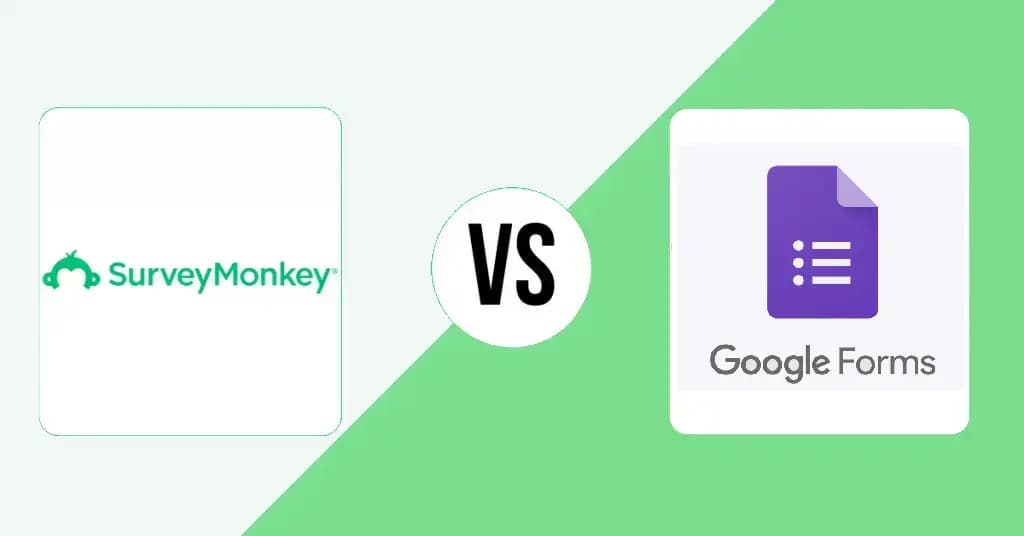Battle of the Survey Giants: Comparing SurveyMonkey and Google Surveys


Tunica Tech
4 min readApril 24
SurveyMonkey vs Google Surveys
Introduction
Online surveys have become an essential tool for businesses and researchers to gather valuable feedback and insights from their target audience. While there are many options available in the market, two of the most popular survey tools are SurveyMonkey and Google Surveys. In this article, we will compare the two platforms in terms of their features, pricing, and overall performance, to help you make an informed decision on which one to choose for your survey needs.
Features
Both SurveyMonkey and Google Surveys offer a variety of features to help users create and distribute online surveys. Some of the key features of SurveyMonkey include customizable survey templates, customizable design options, skip logic, and advanced reporting and analytics. SurveyMonkey also offers integrations with popular tools like Salesforce and Mailchimp.
On the other hand, Google Surveys provides a simpler interface with features like customizable templates, branching logic, and advanced reporting. However, it lacks the option for customizable design and integrations with other tools. Google Surveys also has the advantage of being integrated with Google Analytics, making it easier to track and analyze survey responses.
Pricing
Pricing is an important factor to consider when choosing a survey tool. SurveyMonkey has a free basic plan with limited features, while its paid plans start at $32 per month for the Standard plan and go up to $99 per month for the Premier plan. These plans come with additional features like advanced reporting, custom branding, and integrations, making them suitable for businesses and organizations with more extensive survey needs.
Google Surveys offers a free plan that allows up to 50 survey responses per month. Its paid plans start at $1.50 per completed response for the Basic plan and go up to $6 per completed response for the Enterprise plan. While this may seem more expensive than SurveyMonkey, Google Surveys offers a pay-per-use model which can be more cost-effective for smaller surveys with a limited number of responses.
Usability
Both SurveyMonkey and Google Surveys have user-friendly interfaces that make it easy for anyone to create and distribute surveys. SurveyMonkey has a drag-and-drop editor, making it easier to customize the look and feel of the survey. It also has a mobile app, allowing users to create and manage surveys on-the-go.
Google Surveys also has a simple and intuitive interface, but it may not have as many customization options as SurveyMonkey. However, Google Surveys does have the advantage of being integrated with Google Analytics, allowing users to track and analyze survey responses in the same platform.
Security and Privacy
When it comes to sensitive data, security and privacy are major concerns for organizations. SurveyMonkey has multiple security measures in place, including secure SSL encryption and data center audits for compliance with industry standards. It also offers GDPR compliance for surveys conducted in the European Union.
Similarly, Google Surveys also has strong security measures in place, including secure SSL encryption and regular security audits. It also offers compliance with GDPR regulations for surveys conducted in the European Union. In addition to this, Google Surveys also has the advantage of being part of the Google suite of products, which has a strong reputation for data security and privacy.
Customer Support
Both SurveyMonkey and Google Surveys have a knowledge base and online resources to help users with any issues or questions they may have. SurveyMonkey also offers email, phone, and live chat support for its paid plans. It also has a community forum where users can connect with others for help and support.
Google Surveys offers email and phone support for its paid plans, along with a help center and community forum. However, it does not have live chat support, which may be a disadvantage for users who need immediate assistance.
Conclusion
Both SurveyMonkey and Google Surveys have a lot to offer in terms of features, pricing, usability, security, and customer support. SurveyMonkey may be a better option for businesses and organizations with more extensive survey needs, as it offers a wider range of features and integrations. On the other hand, Google Surveys may be more suitable for smaller surveys and organizations on a budget, as it offers a pay-per-use model and is integrated with Google Analytics.
Ultimately, the decision between the two platforms will depend on your specific survey requirements and budget. We recommend trying out the free versions of both tools to get a feel for their interfaces and features before making a decision.
Need Help With SurveyMonkey?
Setup a Quick Call now.
How to Use
Similar types of Tools
- Quick Links
- Homepage
- Projects
- About Us
- What we do
- Careers
- Services
- Product Dev
- MarTech
- Data Analytics
- Our Products
- TrakNeo
- pURL
- Breathe India
- Arivu
- LIFI